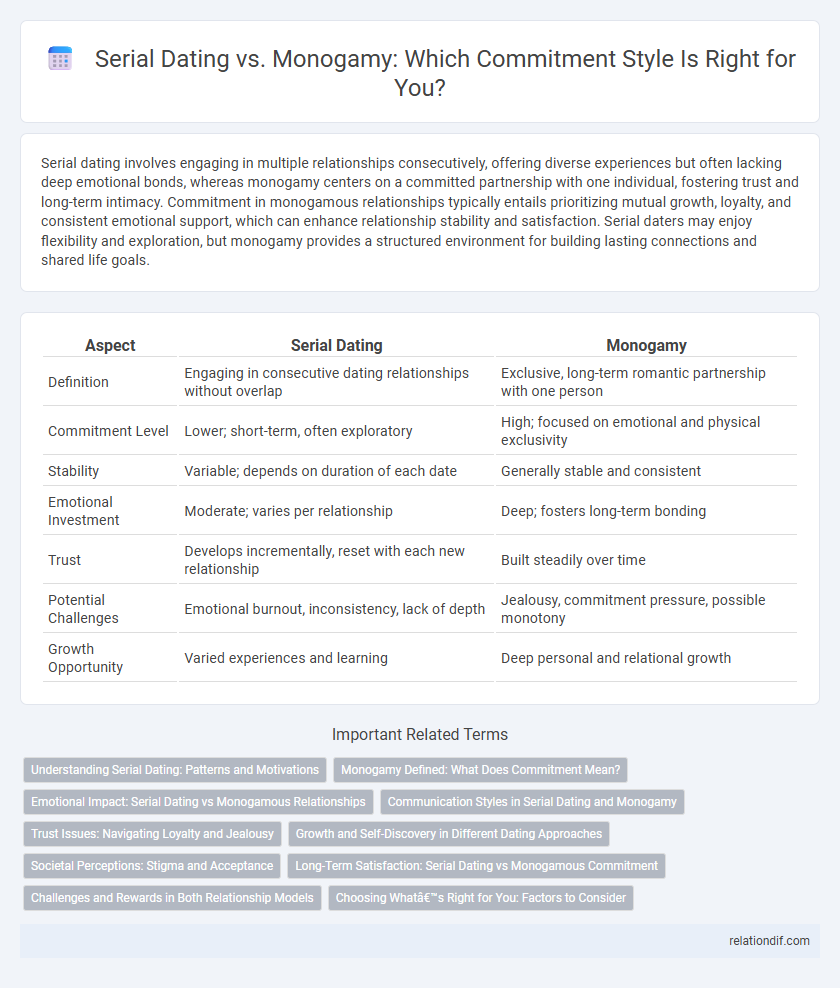Serial dating involves engaging in multiple relationships consecutively, offering diverse experiences but often lacking deep emotional bonds, whereas monogamy centers on a committed partnership with one individual, fostering trust and long-term intimacy. Commitment in monogamous relationships typically entails prioritizing mutual growth, loyalty, and consistent emotional support, which can enhance relationship stability and satisfaction. Serial daters may enjoy flexibility and exploration, but monogamy provides a structured environment for building lasting connections and shared life goals.
Table of Comparison
| Aspect | Serial Dating | Monogamy |
|---|---|---|
| Definition | Engaging in consecutive dating relationships without overlap | Exclusive, long-term romantic partnership with one person |
| Commitment Level | Lower; short-term, often exploratory | High; focused on emotional and physical exclusivity |
| Stability | Variable; depends on duration of each date | Generally stable and consistent |
| Emotional Investment | Moderate; varies per relationship | Deep; fosters long-term bonding |
| Trust | Develops incrementally, reset with each new relationship | Built steadily over time |
| Potential Challenges | Emotional burnout, inconsistency, lack of depth | Jealousy, commitment pressure, possible monotony |
| Growth Opportunity | Varied experiences and learning | Deep personal and relational growth |
Understanding Serial Dating: Patterns and Motivations
Serial dating involves engaging in multiple consecutive romantic relationships without significant breaks, often driven by a desire for exploration and emotional connection. Individuals practicing serial dating may seek variety, personal growth, or validation, reflecting patterns of attachment and relational needs. Understanding these motivations helps differentiate serial dating from monogamous commitment, where exclusivity and long-term stability are prioritized.
Monogamy Defined: What Does Commitment Mean?
Monogamy, defined by exclusive romantic and sexual commitment to one partner, emphasizes emotional fidelity and long-term partnership stability. Commitment in monogamy involves mutual trust, shared responsibilities, and prioritizing the relationship over external attractions or connections. This deep level of dedication contrasts with serial dating, where individuals engage in sequential, non-exclusive relationships without sustained emotional exclusivity.
Emotional Impact: Serial Dating vs Monogamous Relationships
Serial dating often leads to emotional volatility due to frequent relationship terminations and new attachments, which can hinder deep emotional bonding. Monogamous relationships typically foster stronger emotional stability by allowing partners to build trust, intimacy, and long-term commitment. Research indicates that consistent monogamous commitment correlates with higher relationship satisfaction and psychological well-being compared to the fluctuating dynamics of serial dating.
Communication Styles in Serial Dating and Monogamy
Communication styles in serial dating often emphasize short-term clarity and boundary-setting to quickly establish compatibility and manage expectations. Monogamous relationships typically prioritize deeper, ongoing emotional dialogue and conflict resolution to maintain long-term commitment and trust. Effective communication in both contexts hinges on transparency, but monogamy requires sustained vulnerability and shared goals to nurture intimacy.
Trust Issues: Navigating Loyalty and Jealousy
Serial dating often intensifies trust issues due to frequent partner changes, triggering heightened jealousy and insecurity. Monogamy fosters deeper loyalty through consistent emotional investment, which reinforces trust and stability in the relationship. Navigating these dynamics requires clear communication and emotional transparency to mitigate misunderstandings around fidelity and commitment.
Growth and Self-Discovery in Different Dating Approaches
Serial dating encourages rapid exposure to diverse personalities, fostering accelerated self-discovery and adaptability. Monogamy offers a stable environment conducive to deep emotional growth, reinforcing trust and long-term commitment skills. Both dating approaches provide unique pathways for personal development and emotional intelligence enhancement.
Societal Perceptions: Stigma and Acceptance
Societal perceptions of serial dating often carry a stigma rooted in assumptions of instability and lack of commitment, contrasting sharply with the widespread acceptance of monogamy as the social norm. Research indicates that monogamous relationships are frequently idealized in media and culture, reinforcing narratives that equate commitment with exclusivity and long-term partnership. Despite shifting attitudes toward diverse relationship models, serial dating still faces challenges in gaining equal acceptance due to entrenched cultural expectations favoring monogamous unions.
Long-Term Satisfaction: Serial Dating vs Monogamous Commitment
Long-term satisfaction in relationships often differs significantly between serial dating and monogamous commitment, with research indicating higher emotional stability and trust in monogamous partnerships. Serial daters may experience excitement and variety but often face challenges in sustaining deep emotional connections over time. Studies from institutions like the American Psychological Association highlight that monogamous commitment is frequently linked to enhanced life satisfaction and psychological well-being.
Challenges and Rewards in Both Relationship Models
Serial dating often brings challenges such as emotional fatigue and difficulty building deep trust due to frequent transitions between partners, yet it offers rewards like diverse experiences and self-discovery. Monogamy poses challenges including maintaining long-term communication and resolving conflicts, but delivers rewards such as emotional stability, deep intimacy, and shared growth. Both relationship models require commitment, emotional investment, and adaptability to navigate their unique complexities and benefits effectively.
Choosing What’s Right for You: Factors to Consider
Consider personal values, relationship goals, and emotional readiness when choosing between serial dating and monogamy, as these factors influence long-term satisfaction. Evaluate compatibility needs, communication styles, and commitment capacity to ensure alignment with your relationship preferences. Prioritizing self-awareness and honest reflection helps in making informed decisions that support emotional well-being and relationship stability.
Serial Dating vs Monogamy Infographic

 relationdif.com
relationdif.com